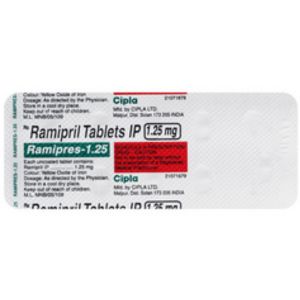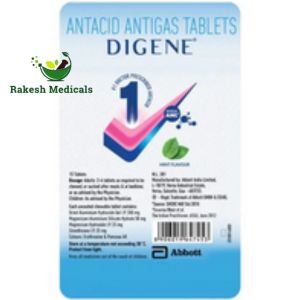Description
INTRODUCTION ABOUT RAMIPRES 1.25MG TABLET
RAMIPRES 1.25MG TABLET contains Ramipril, which belongs to the group of medicines called Antihypertensives. It is used in the management of high blood pressure (hypertension). Blood pressure is the force exerted by the circulating blood on the walls of blood vessels. Hypertension is a condition in which the blood pressure is too high.
RAMIPRES 1.25MG TABLET reduces the risk of kidney problems and can be used as a management following a heart attack. RAMIPRES 1.25MG TABLET is also used to manage heart failure (a condition when the heart is not able to pump enough blood). Symptoms include headache, breathlessness, excess sweating, sleep disturbance, tingling and dizziness.
Your doctor might ask you to make certain lifestyle changes such as eating healthy, adequate sleep, weight and stress management, quitting smoking and alcohol. Your doctor may also advise you to take relevant tests before and during the management with RAMIPRES 1.25MG TABLET.
RAMIPRES 1.25MG TABLET is not recommended for use in patients having kidney problems where blood supply to the kidney is reduced (renal artery stenosis), patients undergoing dialysis or having collagen vascular diseases (scleroderma and systemic lupus erythematosus).
If you are pregnant or breast-feeding, consult your doctor for advice before taking RAMIPRES 1.25MG TABLET. RAMIPRES 1.25MG TABLET is not recommended for use in children and adolescents (under 18 years of age). The most common side effects are headache, dizziness, hypotension (reduced blood pressure), inflammation of the sinuses (sinusitis), diarrhea, skin rash.
USES OF RAMIPRES 1.25MG TABLET
- Manage increased blood pressure, heart failure
- Manage and reduces the risk of getting a heart attack or stroke and slow down the worsening of kidney problems
HOW RAMIPRES 1.25MG TABLET WORKS
RAMIPRES 1.25MG TABLET decreases blood pressure by decreasing the production of substances that raises the blood pressure (Angiotensin Converting Enzyme). This in turn reduces constriction of veins (vasoconstriction). RAMIPRES 1.25MG TABLET distributes extensively amongst your body tissues. As a result, it widens and relaxes your blood vessels, leading to efficient blood circulation.
DIRECTIONS FOR USE
Take RAMIPRES 1.25MG TABLET as advised by your doctor. Swallow the medicine with a glass of water. Do not crush or chew the medicine. Your doctor will decide the correct dose and duration for you depending upon your age, body weight and disease condition.
SIDE EFFECTS OF RAMIPRES 1.25MG TABLET
COMMON
- headache, feeling tired or dizzy
- fainting, orthostatic hypotension (abnormally low blood pressure, especially when you stand or sit quickly)
- dry cough, inflamed sinuses (sinusitis)
- bronchitis, shortness of breath
- stomach pain, diarrhea, indigestion, feeling sick
- skin rash
- chest pain
- cramps or pain in your muscles and joints
UNCOMMON
- balancing problems (vertigo)
- paraesthesia (numbness, tingling, pricking, burning or creeping on your skin)
- loss or changes in taste
- sleep problems
- feeling depressed, anxious or restless
- breathing difficulties or worsening of asthma
- heartburn, constipation or dry mouth
- increased urination
- increased sweating
- loss or decrease of appetite (anorexia)
- increased or irregular heartbeat
- swelling in arms and legs (this may be a sign of your body holding onto more water)
- flushing
- blurred vision
- fever
- reduced sexual ability
RARE
- red and swollen tongue
- feeling confused or shaky
- nail problems (loosening or separation of a nail from its bed)
- cold extremities
- red, itchy, swollen or watery eyes
- severe peeling or flaking of the skin, lumpy, itchy rash
- bruising or skin rash
- blotches (patches) on cold extremities and skin
- feeling of weakness
- disturbed hearing and tinnitus (ringing in your ears)
Stop taking RAMIPRES 1.25MG TABLET and contact your doctor immediately if you experience any of the following side effects:
- concentrated urine (darker than usual in color)
- confusion and fits
- faster heart rate or heartbeat (palpitations), chest pain, tightness in your chest or more serious problems including heart attack and stroke
- shortness of breath or a cough
- blood or bone marrow problems (bruising more easily, bleeding for longer than normal, any sign of bleeding (bleeding from the gums), purple spots, or getting infections more easily, fever, dizzy or having pale skin)
- pancreatitis (severe stomach pain which may reach through to your back)
- hepatitis or liver damage (fever, chills, tiredness, loss of appetite, stomach pain)
- yellowing of skin or whites of your eyes (jaundice)
HOW TO MANAGE SIDE EFFECTS
Inflamed sinuses:
Do steam inhalation whenever you feel a blocked nose or painful sinuses.
Constipation:
Eat plenty of fiber rich foods such as fresh fruits, vegetables, and cereals and drink plenty of water. Exercise more regularly. Consult your doctor for advice.
Diarrhea:
Drink lots of fluids, such as water or fruit juice, to keep yourself hydrated. Do not consume any medicine on your own without consulting your doctor.
Stomach pain:
Try to rest and relax. Try to have smaller and more frequent meals and have them slowly. Keep a heat pad on your stomach. If the symptom does not improve, Consult your doctor for advice.
WARNING & PRECAUTIONS
PREGNANCY
RAMIPRES 1.25MG TABLET is not recommended for use during pregnancy, as it may harm the baby. Consult your doctor if you are, planning to or become pregnant while taking RAMIPRES 1.25MG TABLET.
BREASTFEEDING
RAMIPRES 1.25MG TABLET is generally not recommended for use in breastfeeding women. Consult your doctor before taking RAMIPRES 1.25MG TABLET.
DRIVING AND USING MACHINES
Do not drive or operate any machines if you feel dizzy after taking RAMIPRES 1.25MG TABLET.
ALCOHOL
Avoid consumption of alcohol while taking RAMIPRES 1.25MG TABLET because it might make you dizzier and light-headed. Consult your doctor for advice.
KIDNEY
RAMIPRES 1.25MG TABLET is not recommended in patients with severe kidney disease (like renal artery stenosis) or if the patient is on dialysis. It should be used with caution in patients with kidney disease. Consult your doctor before taking RAMIPRES 1.25MG TABLET.
LIVER
RAMIPRES 1.25MG TABLET should be taken with caution in patients with liver disease. Consult your doctor before taking RAMIPRES 1.25MG TABLET.
ALLERGY
Do not take RAMIPRES 1.25MG TABLET if you are allergic to Ramipril.
HEART DISEASE
RAMIPRES 1.25MG TABLET should be taken with caution in patients who have heart diseases. Consult your doctor before taking RAMIPRES 1.25MG TABLET.
OTHERS
RAMIPRES 1.25MG TABLET is not recommended for use if you:
- have a history of angioedema (itching, hives (urticaria) red marks on the hands, feet and throat, swelling of the throat and tongue, swelling around the eyes and lips, difficulty in breathing and swallowing)
- have diabetes
- have abnormally low blood pressure
Before taking RAMIPRES 1.25MG TABLET, inform your doctor if you:
- have lost a lot of body salts or fluid (vomiting, diarrhea)
- have a low salt diet
- have hyperkalemia (raised levels of potassium in the blood)
- have hyponatremia (low levels of sodium in blood)
- have to undergo desensitization (management to reduce allergy due to bee or wasp stings.
- have to take anesthesia (operation or dental management)
- have collagen vascular disease (scleroderma or systemic lupus erythematosus)
Use in pediatrics:
RAMIPRES 1.25MG TABLET is generally not recommended for use in children and adolescents (under 18 years of age). Consult your doctor before taking RAMIPRES 1.25MG TABLET.
Use in geriatrics:
RAMIPRES 1.25MG TABLET should be used with caution in elderly patients. Consult your doctor before taking RAMIPRES 1.25MG TABLET.
INTERACTIONS
A. Drug – Drug interactions:
Before taking RAMIPRES 1.25MG TABLET, inform your doctor if you are taking any of the following medicine:
- sacubitril, valsartan (used to manage a type of long-term (chronic) heart failure in adults)
- diuretics (used to manage high blood pressure) Ex. furosemide, hydrochlorothiazide
- anesthesia (used in operations or dental management) Ex. lidocaine
- Non-Steroidal AntiInflammatory Drugs (used to relieve pain and inflammation) Ex. ibuprofen or indomethacin and aspirin
- ephedrine, noradrenaline or adrenaline (used to manage low blood pressure, shock, cardiac failure, asthma or allergies)
- ciclosporin, sirolimus, everolimus (used in management of graft rejection after transplant)
- spironolactone, triamterene, amiloride, potassium salts, trimethoprim alone or in combination with sulfamethoxazole (used for managing infections)
- heparin (used for thinning blood)
- prednisolone (steroid used to reduce inflammation)
- allopurinol (used to lower uric acid in blood)
- procainamide (used for heart rhythm problems)
- racecadotril (used to manage diarrhea)
- immunosuppressants (used to suppress the immune system) ex. temsirolimus, everolimus, sirolimus
- vildagliptin, insulin (used in management of diabetes)
- lithium (used in management of mental health problems)
- angiotensin II receptor blocker (usen in diabetes related kidney problems) Ex. aliskiren, valsartan, telmisartan, irbesartan
- neprilysin (NEP) inhibitors (used in management of heart failure and high blood pressure) Ex. racecadotril
Overdosage:
If you or anyone else accidentally take too much of RAMIPRES 1.25MG TABLET, consult your doctor immediately or visit the nearby hospital.
SYNOPSIS
| Drug | : | Ramipril |
| Pharmacological Category | : | ACE Inhibitors |
| Therapeutic Indication | : | Hypertension |
| Dosage Forms | : | Tablet, Capsule |
MORE INFORMATION
- Keep RAMIPRES 1.25MG TABLET out of reach from children
- Store at room temperature below 30°C
FAQs ABOUT RAMIPRES 1.25MG TABLET
Can RAMIPRES 1.25MG TABLET be used in diabetes and kidney diseases?
Yes. RAMIPRES 1.25MG TABLET can be used in kidney disease alone or in kidney disease associated with diabetes and in diabetes without kidney disease. Your doctor might prescribe you other drugs or will be able to decide better according to your condition.
Is RAMIPRES 1.25MG TABLET safe to take?
Yes. RAMIPRES 1.25MG TABLET is safe and effective in managing mild to moderate high blood pressure. Your doctor will be able to decide the correct management for you.
Can RAMIPRES 1.25MG TABLET cause fast heart rate?
Yes. Palpitations or fast heart rate are potential side effect of RAMIPRES 1.25MG TABLET. Contact your doctor immediately if you feel any such symptoms after taking RAMIPRES 1.25MG TABLET.
What precautions do I need to follow while taking RAMIPRES 1.25MG TABLET?
Patients taking RAMIPRES 1.25MG TABLET must inform their doctor about their pre-existing disease conditions like kidney, heart, or liver problems as you may develop serious side effects. Consult your doctor immediately if you experience any unusual symptoms after taking RAMIPRES 1.25MG TABLET.
Can RAMIPRES 1.25MG TABLET cause hyponatremia?
Yes. RAMIPRES 1.25MG TABLET can lead to hyponatremia (low sodium levels in blood). Your doctor might ask you take timely blood tests to keep a check on your blood sodium levels while managing you with RAMIPRES 1.25MG TABLET.
REFERENCES
1. KD Tripathi. Drugs Affecting Renin-Angiotensin System And plasma Kinins. Essentials of medical pharmacology. 7th edition. 2013. Page – 503
2. Florim Cuculi, Paul Erne. Combined neutral endopeptidase inhibitors. NIH. National Library of Medicine, National center for biotechnology information. Pubmed.gov. April 2011. [Accessed 9th April 2022] https://pubmed.ncbi.nlm.nih.gov/21323474/#:~:text=Expert%20opinion%3A%20NEP%20inhibitors%20were,angioedema%20stopped%20their%20widespread%20use.
3. Sheila A. Doggrell. Is Ramipril the pril for diabetes and kidney disease? NIH. National Library of Medicine, National center for biotechnology information. Pubmed.gov. May 2001. [Accessed 9th April 2022] https://pubmed.ncbi.nlm.nih.gov/12768220/
4. M Schreiner, B Berendes, M Verho, A Langley, V Cairns. Antihypertensive efficacy, tolerance, and safety of long-term treatment with ramipril in patients with mild-to-moderate essential hypertension. NIH. National Library of Medicine, National center for biotechnology information. Pubmed.gov. 1991. [Accessed 9th April 2022] https://pubmed.ncbi.nlm.nih.gov/1725024/
5. I Ramasamy. Severe hyponatraemia during therapy with ramipril. NIH National Library of Medicine, National center for biotechnology information. Pubmed.gov. Sep 2009. [Accessed on 9th April] https://www.ncbi.nlm.nih.gov/pmc/articles/PMC3029881/
6. Sanofi. Electronic Medicines Compendium (EMC). [Revised in Nov 2020] [Accessed 8th April 2022] https://www.medicines.org.uk/emc/files/pil.8066.pdf
USEFUL DIAGNOSTIC TESTS
- Serum electrolyte
- Kidney function test
- Cholesterol test
- ECG (Electrocardiogram)






Reviews
There are no reviews yet.